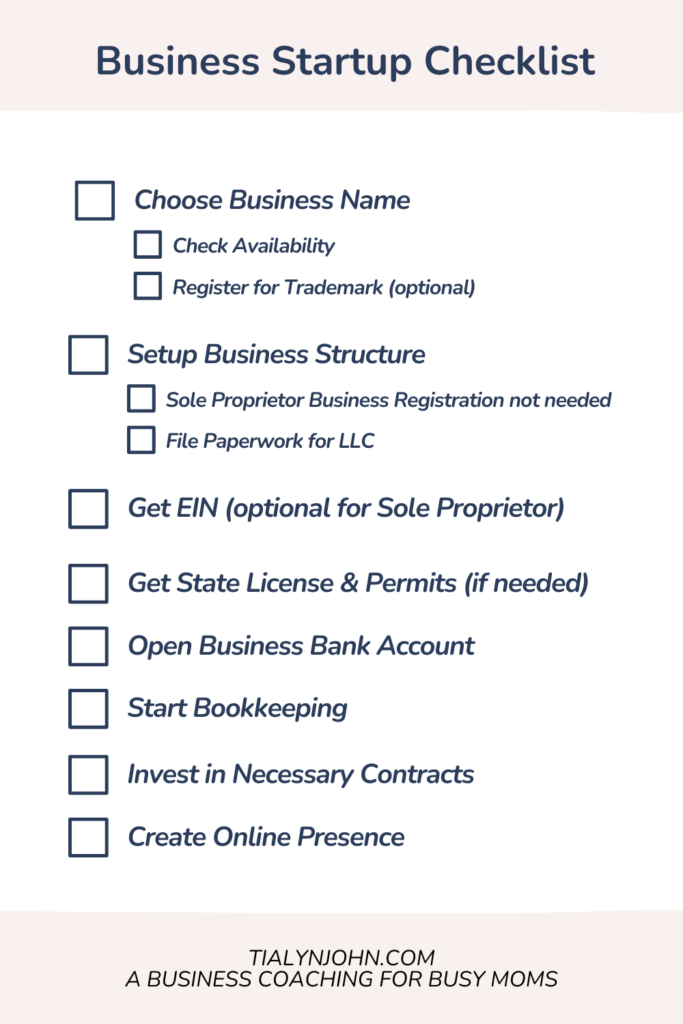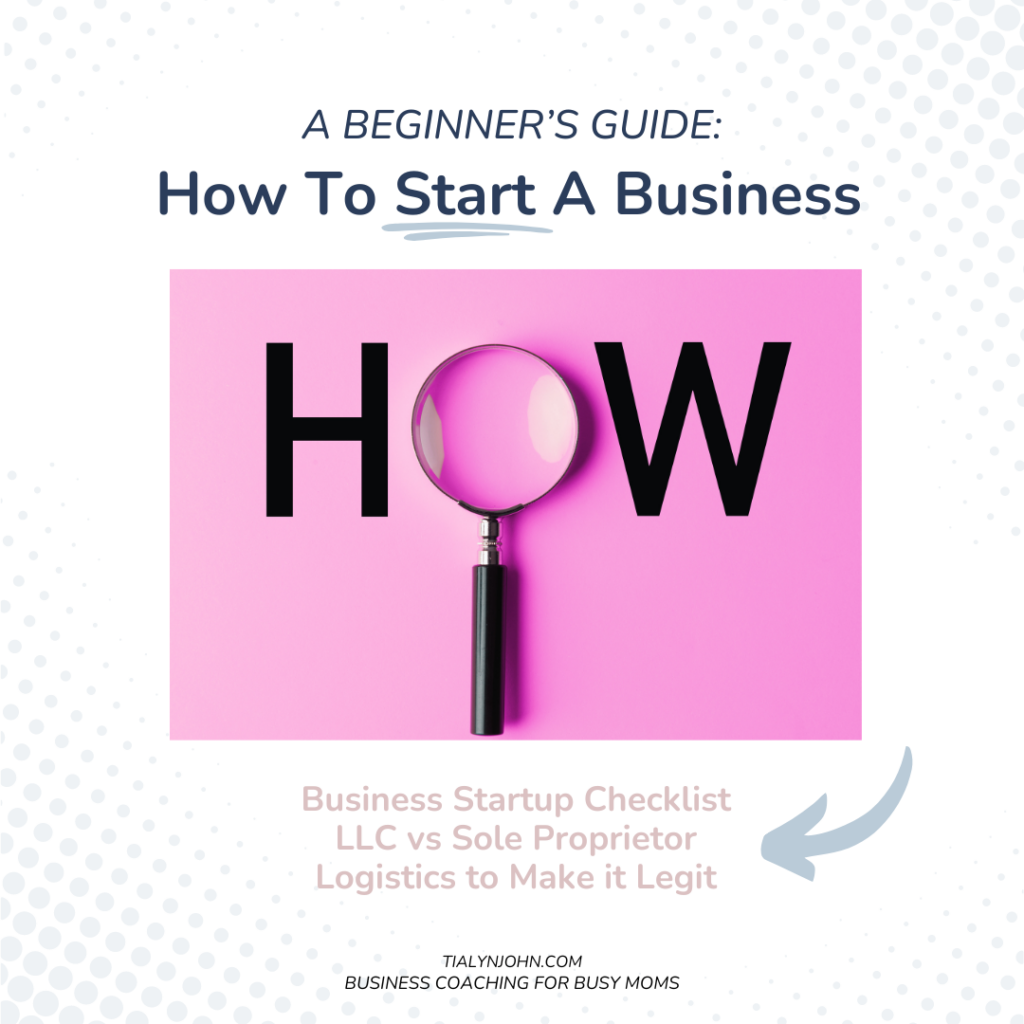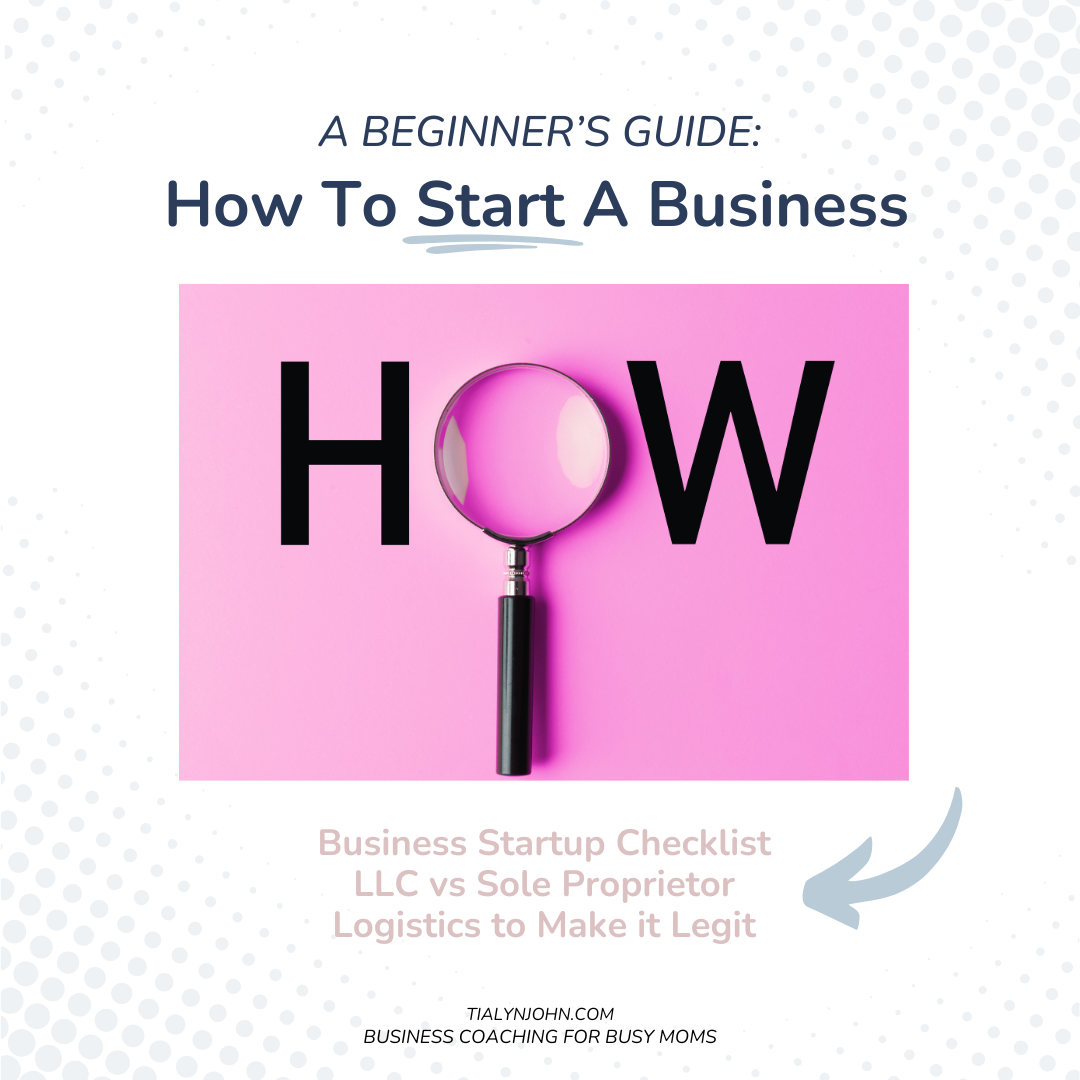Starting a business can be fun, from dreaming up ways to turn your passion into income to picking out your brand colors. However, once reality sets in that you need to set up your business so it is legit, and put some backend business logistics in place, you might start to feel overwhelmed. (No worries; I plan to help you push that overwhelm aside with a business startup checklist.)
No matter what kind of business you want to start, there are some basic things you need to do to get it up and running. And around here, we work smarter, not harder! So let me save you the trouble (and time) of figuring it all out on your own and show you how to start a business.
1. Choose Your Business Name (Legally)
Picking a business name is important because it’s how people will recognize your brand. It is also essential that you do not accidentally take another business name, as a lawsuit is not your end goal.
How do you decide what to name your business?
- Choose a business name that represents your business (services you offer or products you sell) well. PS- I would consider using you name as part or all of your Brand name. Especially if you are in a service industry.
- Choose a name that is easy to remember and quickly recognizable as your brand. If it is hard to remember, you will not be memorable!
- Ensure that your business name is not already in use. (AKA check to see if that name already exists for another business.)
Where do you look to see if your business name is available?
What is the cost to see if your business name has already been taken?
The United States Patent and Trademark Office let’s you do a free search to check for business names that are trademarked. To check for business names not under trademark but in use in your state, you can Google your state’s Secretary of State to find online records of business names that are registered.
To find out if your business name is already in use in the state of Arizona, use the Arizona Corporation Commission website to do a free search and the Arizona Secretary of State.
Do you need to trademark your business name?
A trademark for your business is optional. If you want a more prominent brand and the name is extremely important to your business, I recommend a trademark to protect you at the Federal level. A trademark can protect your business name, logo and unique branding so that others can not use it. However, many small service-based businesses operate without a trademark for their business name.
2. Setup Your Business Structure (Sole Proprietor or LLC)
Choosing the right business structure can make a big difference in liability, taxes, and even credibility. There are different levels of business structures. Since most of my clients fall into a Sole Proprietor or LLC (electing s-Corp), I will speak to those two in this post.
You can run a legitimate business as a Sole Proprietor.
73% of the businesses1 in the US are sole proprietorship. Sole proprietorship means you can run a business in your state without registering it as a business. In short, this means less paperwork, less upfront investing in business structure, but also less legal protection.
What does being a sole proprietor look like?
- You still have to report your business income/losses on your taxes
- There is no legal separation between your business and your personal property. (So if you get sued, your personal assets such as savings accounts, cars, and home could be at risk).
Please note: just because you do not register your business with your state does not mean you are exempt from necessary licenses and permits your state might require to operate your business. We are going to talk about those in a bit.
Should You Set Your Business Up As An LLC (Limited Liability Company)?
You might wonder if you can run your business as a sole proprietor, why would you want to pay to be an LLC. Especially knowing the majority of businesses in the US are sole proprietors. For many business startups, the LLC is a popular choice due to its flexibility in taxes and legal protection.
There are two major reasons why an LLC might be ideal for you.
- You want your business legally separated from your personal assets.
- You want to take advantage of possible tax savings.
What kind of tax savings can I have as an LLC?
It is important to understand that not every LLC saves more in taxes than a sole proprietor. It actually depends on how much money your business brings in and what your tax election is. So a CPA or accountant would be best to answer this question because every business is different. I encourage you to set up a free call with a tax professional and discuss if an LLC electing to be taxed as an S-Corp would be an intelligent move for your business tax-wise. I can tell you it has saved me thousands in taxes, which is why I decided to become an LLC.
How do I setup an LLC?
To set up your LLC, you should do a quick Google check to see what agency within your state handles business filings. I recommend going straight to the source to save money! Many websites will walk you through completing your LLC and charge you a fee for that online service, but you eliminate those costs by going directly to the source. In Arizona, you can file your LLC through the Arizona Corporate Commission. It might take you about an hour to fill out the online paperwork.
Please note: the cost of an LLC will vary by state. Some states charge a one-time fee, and others charge yearly. This is another reason why you should speak to a tax professional before you set up an LLC. You want to make sure your rate of return is worth it.

3. Get an (EIN) Tax Identification Number
If you are an LLC, you will need an EIN.
How do I get a EIN?
You can get your EIN online for free from the IRS. (Please note that if you are setting up your LLC, you will need to wait for the approval of your LLC before requesting your EIN.)
Do you need an EIN (Employer Identification Number) if I am a sole proprietor?
If you are a sole proprietor, an EIN is not necessary but recommended if you will be filling out I-9 forms.
When would you fill out an I-9 form?
If you are getting paid more than $600 a year for a service you are offering another business, you will likely fill out an I-9 so the business contracting you can issue you a 1099-NEC.
4. Get Your State Licenses and Permits
There are a variety of businesses that require various licenses and permits to operate legally within your state. It is essential for you to seek out what permits and licenses you need to be compliant. A quick Google search and time on your state’s Department of Revenue website will help you find what permits or licenses you need to operate in your state, city, and county legally.
A common license that most of my clients need is a Sales Taxes License. In Arizona, your sales tax license is a TPT (Transaction Privilege Tax) license. If you live in Arizona, you can learn more about what licenses and permits you need on the State of Arizona Department of Revenue website.
5. Open a Business Bank Account
Once you complete the list above, you can open a business checking and savings account. This is a critical step in separating your personal and business expenses. Even if you are a sole proprietor, using a business account will be necessary for tax and bookkeeping purposes.
All banks are different, and so are their fees and minimum balances on business accounts. Be sure to research online to see if there are free options.
6. Start Your Businesses Bookkeeping
Clear financial records are crucial for the success of any business. Unfortunately, this task is usually easy to procrastinate, which can cause a headache come tax time.
A simple system like Google Sheets can be an ideal way to keep records of your income and expenses, especially in the early stages when finances may be tight.
When your business starts bringing in profit, I recommend using QuickBooks! It has been one of the best investments for keeping my finances squared away and mileage tracked. I also use their business debt card and earn 5% interest in my business savings account with them. You can save 20% more than their average sign-up savings with my referral link.

7. Protect What You Build with Contracts & Terms and Conditions
“Contract” is a term used in the business world to build trust and protect. Contracts (along with Terms and Conditions) ensure clarity and fairness for all parties involved in services, purchases, and outsourcing of work. I use professional service contracts from legal template services like The Contract Shop, which offers customizable agreements for various industries at a fraction of the cost of hiring a legal team.
8. Create Your Online Presence
A modern business cannot succeed without a digital presence. To begin with, you might focus on using a social platform. This is a free way to market your services and start to build brand awareness.
Eventually, you will want to consider a website. There are many hosting sites available; however, I love Showit for their easy-to-use website templates and top-notch customer service. If you would like a free month you can use my referral link and with code: tialyn
You can learn more about how to build an online presence as a business owner in this blog post.
Take Starting Your Business One Step At A Time
Remember, the path to a successful business is as much about the learning process as it is about the destination. Each box checked on this business startup checklist is a stride toward your dream business. So do not let any of these tasks overwhelm you. Simply start by putting each item on your schedule and accomplishing them one at a time. You do not have to complete them all in one day. Go at your own pace!
Are you ready for the next level in your business?
Curious if I could help you get the ball rolling on your dreams? Feel free to reach out and schedule a free business strategy call! I would love to chat all things business dreams and how we can make those a reality!
- https://taxfoundation.org/research/all/federal/overview-pass-through-businesses-united-states/#:~:text=According%20to%20Census%20data%2C%2073.1,proprietorships%20(20.3%20million%20firms).
↩︎
